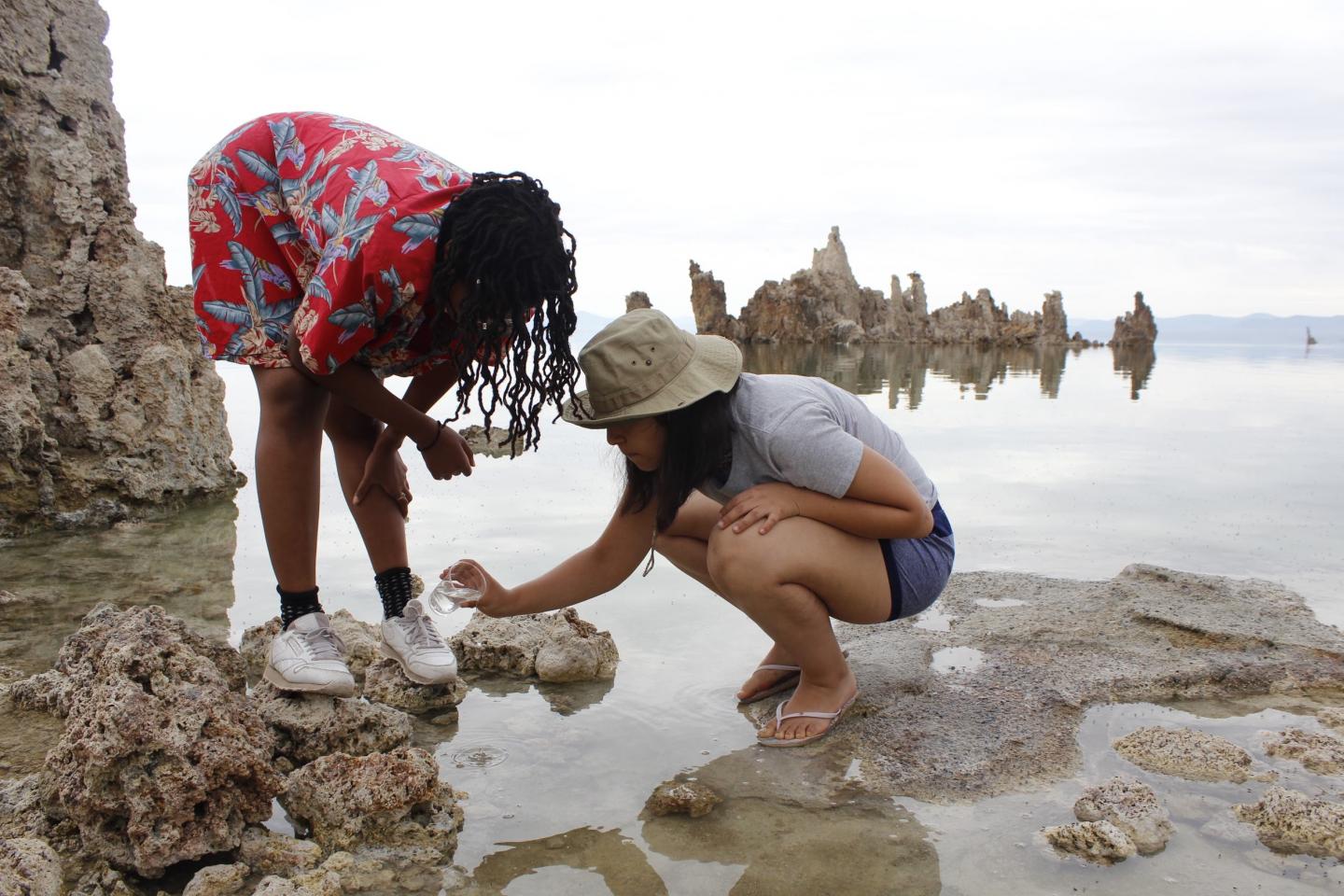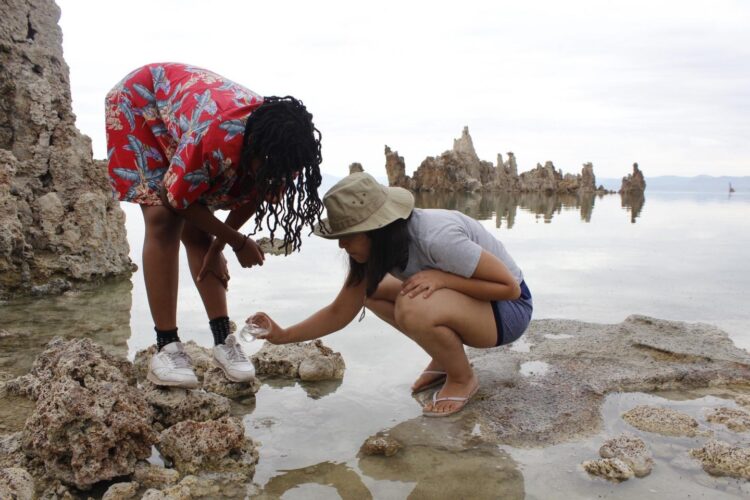Hands-on field learning key to retention, success of underrepresented biology students

Credit: Mickie Tang
The challenge of diversifying STEM fields may get a boost from the results of a new study that show field courses help build self-confidence among students–especially those from underrepresented groups.
Field courses build the self-confidence and “scientific competence” of all students, but the benefits are particularly noteworthy for students from groups that are underrepresented in STEM fields, who are more likely to switch majors or drop out of college, according to researchers at UC Santa Cruz who have published the results of the study in the journal Ecology and Evolution.
The article, “Field Courses Narrow Demographic Achievement Gaps in Ecology and Evolutionary Biology,” sheds light on the benefits field courses offer students and the role they could play in boosting the retention and success of underrepresented students.
The study compared UCSC undergraduates admitted from 2008 to 2019 who participated in a field course to those who did not. Demographic data for race/ethnicity, socioeconomic status, first-generation college student, and gender were collected. In addition to greater self-confidence, the findings reveal that students who take field courses are more likely to graduate from college, have higher GPAs at graduation, and are more likely to stay in the ecology and evolutionary biology major. Even a modest, two-unit field course produces benefits for students: at UCSC, Biology 82: Introduction to Field Research meets once a week with two overnight weekend field trips.
“Field courses offer some potentially high-impact services that aren’t available in traditional lecture courses,” said postdoctoral researcher and first author Roxanne Beltran. “Students in field courses work as a team and collaborate rather than compete for the best grade. They get to sit around a campfire and feel like part of a community. And they are interacting with faculty who aren’t standing behind a lectern, which can be intimidating.”
As participants build confidence in field courses, the experience creates “a self-fulfilling prophecy of success,” she said. “It’s a feedback loop. Students see that they can be successful, which builds their confidence, which leads to further success.”
Beltran, who is completing a two-year fellowship funded by the National Science Foundation and the UC President’s Postdoctoral Fellowship Program, says field courses are one of the best investment colleges and universities can make in “saving dreams” of aspiring scientists.
“Diversity in STEM fields is critical,” said Beltran. “Scientists can help solve global challenges like disease outbreaks and climate change. But we can’t do that without the diversity of ideas that comes from diverse experiences. Our success is tied unequivocally to the diversity of the scientists doing the work.”
Saving dreams and closing demographic gaps
For aspiring biology majors, the first two years of college courses are dominated by what some call the “math-science death march”: a series of required courses in math, chemistry, physics, and biology that are a far cry from the vision that propels most undergraduates.
“Students who want to do biology in college have a vision of studying trees, or birds, or soils, or marine invertebrates in the intertidal zone,” said senior author Erika Zavaleta, a professor of ecology and evolutionary biology at UCSC. “They have a vision of discovery, of being outside, of doing data collection.”
Field courses give students hands-on experience doing science in collaboration with their peers: identifying species, designing and conducting experiments, analyzing data, and doing oral presentations of results. “Field courses have a big positive impact on students’ sense of their scientific capacity,” said Zavaleta. “It’s true for all students, but it’s bigger for underrepresented groups than any other.”
In the study, which focused on the self-efficacy benefits of field courses, underrepresented students ranked their own sense of ability lower before they participated in the field course, but they emerged from the course with their sense of self-efficacy on par or ahead of their non-underrepresented peers, she noted.
“The course closed a demographic gap,” said Zavaleta. “That’s so exciting.”
Field courses may be more expensive than large lecture courses, which Zavaleta said are “very efficient.” “But you get what you pay for,” she said. “The impact on students is greater. We need to rethink how much we invest in these experiences.”
“If students have an early opportunity that validates what being a scientist is, that can carry them and keep them going until they get upper-division opportunities to do an internship, or a research project, or a senior thesis,” said Zavaleta. “Let’s give these students the opportunity to do what they came here to do before they get to year three of their college experience.”
Retaining diversity in STEM
Undergraduates from diverse demographic backgrounds arrive at college equally interested in studying biology, but students from groups that are underrepresented in STEM fields are significantly less likely to earn a biology degree, either because they switch majors or leave campus entirely, said Zavaleta. That phenomenon, which takes place at colleges and universities across the country, has put the focus on retaining STEM students.
“They’re coming to us across the board wanting to do biology, and it’s on us to keep them and help them succeed,” said Zavaleta, noting that most students leave the Ecology and Evolutionary Biology major during their first year or two.
Boosting self-efficacy is one part of a retention strategy, but efforts must also address building a sense of belonging and a sense of community for underrepresented students, noted Zavaleta, a veteran field-course instructor. “Field courses are such an important tool because they tackle both,” she said. “There’s nothing like making a meal together on a camping trip, or identifying a grass, or sloshing in a stream, or sitting around a campfire to build a sense of community.”
Beltran, a UCSC alumna, recalled struggling to find her place in 400-student lecture courses before she enrolled in a quarter-long field course with Zavaleta. “I’m studying these students, because I was one of them,” said Beltran. “I was questioning whether I deserved to be in college, and whether I could have a career in science.” The field course rekindled the desire she’d had in high school, and in July, she will join the UCSC faculty as an assistant professor of ecology and evolutionary biology (EEB).
“The emphasis was really different when I was an undergraduate student,” she said. “We’ve learned a lot since then about the importance of teaching in nontraditional ways.”
Encouraging all students to feel welcome
In the study, the researchers found that underrepresented students are less likely to enroll in field courses. That problem, however, is not insurmountable.
“We’ve spent five years flipping that,” said Zavaleta, a dedicated advocate of STEM diversity who received a $1 million grant in 2017 from the Howard Hughes Medical Institute to fund a five-year effort to support students in ecology and conservation biology all the way through to graduation. Her program provides increased access to research-based field courses and internships, as well as mentoring and a supportive community, with the goal of launching a diverse new generation of conservation leaders.
“We think of field courses as gated and maybe elitist, because they can be expensive, or we think they’re only for students who already have camping equipment and experience,” said Zavaleta. But those barriers can be overcome, she said. When Biology 82 was introduced, instructors Don Croll and Gage Dayton made a concerted effort to get the word out to all students through UCSC’s ten colleges, student groups and organizations, and academic advisers. Scholarships remove cost barriers, and the relatively small weekend time commitment helps make the course available to students who work, she noted.
“Over time, the word gets out, and now we have students across campus participating–not just white students, not just wealthy students, not just biology students, and most haven’t camped before,” said Zavaleta, noting that Biology 82 is offered six times per year but still can’t meet student demand. “If you tackle the relatively easy barriers, field courses become an engine for inclusion and equity.”
Zavaleta is excited by the results of the study “because they show us that it’s true.”
“Why can’t every student in the major have a field experience?” she asked. “Why can’t every student in the division? Every student on campus? This is how UCSC started: It was all about inquiry in peer groups. We know how to do this, and we are doing it. We just need to do it for everybody.”
###
Additional coauthors on the study include Don Croll, professor of ecology and evolutionary biology; Gage Dayton, administrative director of the UCSC Natural Reserve System; Erin Marnocha, program coordinator with the UC Natural Reserve System; and Alexandra Race, a graduate student in education at UCSC.
Media Contact
Jennifer McNulty
[email protected]
Original Source
https:/
Related Journal Article
http://dx.





